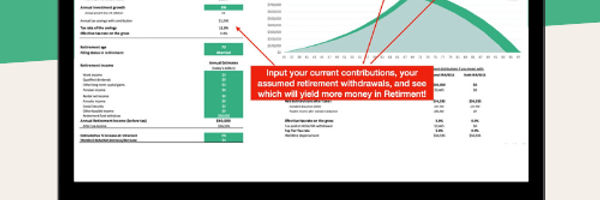On February 20, 2008, the U.S. Supreme Court ruled that individuals have a right to recover 401(k) losses based on what were considered fiduciary breaches. This landmark decision means the 50 million Americans participating in a 401(k) plan now have a right to recover their loss if plan administrators don't fulfill what's considered their obligation to participants to manage their plans wisely.
In this article, we're going to outline the Supreme Court's decision on losses suffered by participants of 401(k) plans, and how the verdict rendered by these judges differs from the rulings of the past. We'll also provide a quick background on the court case, and some guidance on how to figure out if a loss on a 401(k) plan is protected under this decision.

Roth IRA or 401k? This template will answer your questions.
With this template, you will get:
All DFY, simply add your details
Charts for comparison and clear answer
Easily update for any year (2023, 2024, 2025, etc…)

Retirement Plan Losses and ERISA
Back in November 2007, the Supreme Court justices heard the case of LaRue v. DeWolff, Boberg & Associates, Inc. in which James LaRue's lawyers argued that he should be allowed to try to recover $150,000 that was lost from his retirement account when the plan administrator failed to follow his directions.
In the past, the courts have ruled that cases of fiduciary breach could be taken to court if they affected an entire retirement plan. This approach effectively prevented individual lawsuits. When making its decision that individuals could be compensated for such losses involving a fiduciary breach, the Supreme Court focused on two sections of the Employee Retirement Income Security Act of 1974 (ERISA).
Defined Contribution Plan Ruling
Section 502(a)(2) of ERISA clearly provides remedies for fiduciary "misconduct" with respect to the entire plan, not an individual's account. In a defined benefit plan, which provides participants with a fixed benefit (often referred to as a pension plan), any misconduct by the plan administrator that results in a loss would affect the entire plan. Therefore, individuals were barred from claims since the entire class of participants was allowed to file a claim.
In the LaRue case, the plan loss associated with the fiduciary misconduct involved a defined contribution plan. That is, a typical 401(k) plan where the participant was not guaranteed a fixed monthly payment in the future, but rather their investment decisions could directly affect their fund performance, and the future value of their account.
With a defined contribution plan, the court focused on Section 409 of ERISA, which relates to the proper management, administration, and investment of plan assets to ensure that benefits are paid to plan participants. It was here the Supreme Court found that under the law:
"...statutory provision authorizes a participant in a defined contribution pension plan to sue a fiduciary whose alleged misconduct impaired the value of plan assets in the participant's individual account."
401(k) Loss Suffered by LaRue
In the LaRue case, legal action was taken against both the employer DeWolff, Boberg & Associates, as well as the 401(k) retirement plan administered by DeWolff. This 401(k) plan allowed participants to direct their investments in accordance with specified procedures.
LaRue claimed that in the years 2001 and 2002, he instructed plan administrators to make certain changes to his stock market investments, but his directions were never followed. Furthermore, he claimed that because of this omission, the value of his 401(k) plan was lowered by approximately $150,000. For this reason, LaRue believed he should be made-whole, or compensated for the loss.
This Supreme Court ruling means that LaRue, and others in this situation, now have a legal right to go to court to determine whether their claim of fiduciary misconduct merit the reimbursement they might be seeking.
Lawsuits in the Future
Lawyers, as well as investment managers, expect this ruling to result in more lawsuits against both 401(k) administrators as well as sponsoring companies. In fact, litigation may now be possible in cases where funds have underperformed, excessive fees have been charged, or there is a lack of investment choice.
In the future, employers and 401(k) plan administrators can help protect themselves from such lawsuits by:
Entering into contracts with third-party providers that include compensation in situations where mistakes result in a participant's financial loss.
Allowing 401(k) plan participants to make their own account changes; thereby making the employee directly responsible for their investments.
Purchasing fiduciary liability insurance to protect against these claims, or assessing the coverage under an existing insurance policy for protection against such lawsuits.
Reviewing their 401(k) plan procedures to ensure they comply with the Pension Protection Act of 2006, as well as Department of Labor rules and regulations.



